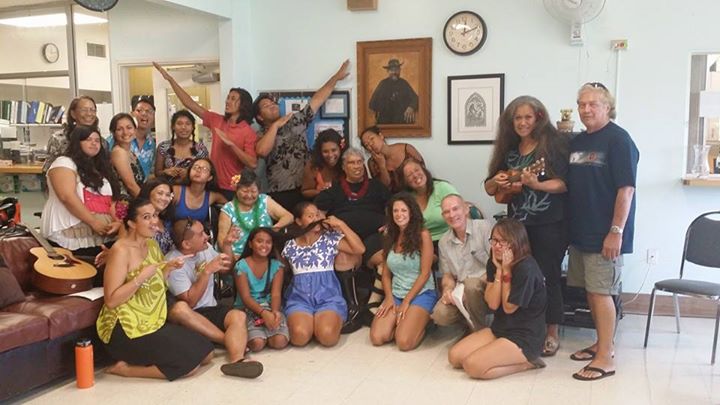
With the recent opening of the movie "Aloha" many Asian American groups have cried foul for director Cameron Crowe whitewashing Hawaiʻi. Crowe states that Emma Stone's character is supposed to be a multiracial mix of White, Native Hawaiian, and Chinese (a common blend in Hawaiʻi), but instead of finding an actress that has such heritage, Stone was chosen instead. This is problematic on a couple of levels.
Understanding Hawaiian Demographics and History

InterVarsity Students and friends with kupuna (elders) at Hoʻolohe Pono, an immersion into the Native Hawaiian community.
The islands have a very multiethnic population, but based on the movie, one might think that Hawaiʻi is only White/Haole [1].
Viewers of the movie may not realize that the majority of Hawaiʻi is non-White with large groups being Native Hawaiian, Filipino, Japanese, Chinese, Korean, Samoan, and Micronesian. Even the Black, Hispanic, and American Indian/Alaska Native communities make up 3.2%, 9.8%, and 2.5% of the population respectively. 23.8% of people are multiracial [2].
Due to Hawaii's occupied status, Haole and others outsiders can move in without ever needing to get to know any Native Hawaiians (the indigenous people of the land) or locals like me (who trace our lineage to laborers on sugar and pineapple plantations that began in the late 1800s). They do not currently even need a passport to freely move in and out of a land and culture that is not their own. That's privilege. Haole have access to political, economic, and colonial power and often do not "need" the rest of us to get the "taste of paradise" other than as service providers [3].
Erasing the Identity of Pacific Islanders
All that being said, some of the language I've seen on Facebook have been problematic in how they talk about ethnicity, especially in saying that Emma Stone's character is half-Asian. Actually, she is half-White, quarter-Chinese, quarter-Hawaiian. Chinese is Asian, but Native Hawaiian is not.
Why is this significant?
We sometimes unconsciously perpetuate colonial language by coopting the identity of our Pacific Islander sisters and brothers.
The term "Asian Pacific Islander" is almost never used in Hawaiʻi. I don't know any Pacific Islanders (Native Hawaiians included) that would call themselves Asian if they are not mixed with an Asian ethnicity (eg, Filipino, Japanese, Chinese, Korean, etc). Pacific Islanders are distinct from East, Southeast, and South Asians, and include Polynesians (Hawaiian, Samoan, Tongan, etc), Micronesians (Pohnpeian, Marshallese, Chamorro, etc), and Melanesians (Solomon Islander, Papua New Guinean, Vanuatuan, etc). Living in the Pacific doesn't make me Pacific Islander or Hawaiian because my ancestry takes me back to Asia five generations ago.
Part of the significance of distinguishing Asians from Pacific Islanders is acknowledging and recognizing distinct cultures, value sets, and issues faced by each community. Lumping them together is an erasure of that uniqueness and prevents us from knowing the fullness of how we have been created (ie, Babel, Revelation 7, etc), and it also makes it much more difficult to advocate for the needs of our communities.
While there are common needs as people of color, knowing how to truly stand for justice, and being able to do it well, requires acknowledgement, understanding, and willingness to engage in the real issues of our communities. Doing so is difficult if we don't understand who comprises our communities and how we are similar and different.
We sometimes unconsciously perpetuate colonial language by coopting the identity of our Pacific Islander sisters and brothers.
 A Humble Request
A Humble Request
As a Hawaiʻi-grown Asian advocate for the Hawaiian community, may I humbly ask you to carefully consider how we talk about Pacific Islanders in future posts and discussions? Instead of talking about Polynesians/Micronesians/Melanesians as Asians, can we talk about them as another racial group that we can honor and advocate for as we may do for the Black community?
Our Asian community has demonstrated before that through our own struggles we can advocate on behalf of other groups instead of speaking for them. That shows a lot of courage and honor.
So what can we do to advocate on behalf of our Pacific Islander sisters and brothers? Here are some suggestions:
- Don't use the term "Asian Pacific Islander." Doing so often only highlights the privilege of Asians in erasing Pacific Islanders in dialog.
- Make a distinction between Native Hawaiian and being from Hawaiʻi (and, Pacific Islander and being from a Pacific Island). The former are the indigenous people of the islands, and the rest of us are settlers.
- Listen and learn. There are stories of both beauty and struggle among Pacific Islanders that sometimes parallel our own stories. And yet some of their stories of struggle are due to our Asian people.
Thanks for reading.
Brennan Takayama
*Special thanks to Native Hawaiian/Pacific Islander InterVarsity staff and volunteers for their feedback.
References:
- White/Haole alone represent 25.0% of Hawaii's population, and multiracial Haole 42.6%. Haole is the Hawaiian word for White person. See wehewehe.org for a comprehensive Hawaiian language dictionary.
- 2013 American Community Survery
- See research from Dr Keanu Sai about Hawaii's status as a sovereign nation, illegally occupied by the United States.